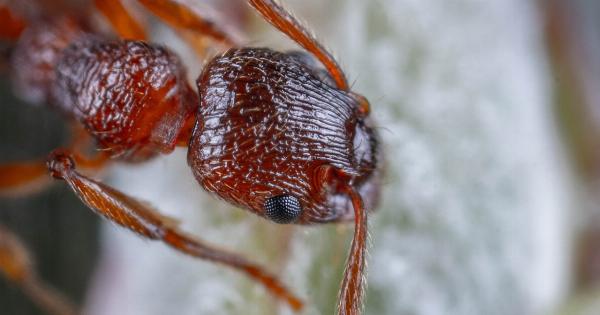Ants are tiny creatures that can become a big nuisance when they invade our homes. While there are numerous chemical sprays and traps available on the market to exterminate ants, sometimes a more ironic approach can be equally effective.
In this article, we explore some of the most unconventional methods of dealing with ants that will make you think twice before reaching for those traditional insecticides.
1. Coffee Grounds: The Ant Repellent from Your Morning Brew
Believe it or not, ants have an intense aversion to coffee grounds. The strong aroma and bitterness of coffee make it an effective natural deterrent.
Sprinkling used coffee grounds around windows, doors, and areas where ants tend to enter your home can discourage them from crossing the coffee-scented barrier.
2. Chalk: A Surprising Ant Barrier
Draw a line with chalk around windows, doors, or any other entry points ants commonly use, and they will avoid crossing it. The reason behind this peculiar phenomenon remains a mystery, but many homeowners swear by this simple yet effective method.
3. Vinegar: The Multipurpose Ant Exterminator
Vinegar not only adds flavor to your dishes, but it can also repel ants. Mix equal parts of vinegar and water and spray the solution around ant trails and entry points.
The strong scent of vinegar disrupts the ants’ pheromone trails, causing confusion and discouraging them from returning.
4. Cucumber Peels: A Natural Ant Deterrent
Ants have an aversion to cucumber peels due to the presence of a compound called trans-2-nonenal. Placing cucumber peels near ant-infested areas can send them scurrying away, making it a simple and eco-friendly way to deal with these unwanted guests.
5. Citrus Peels: A Fragrant Ant Repellent
The strong scent of citrus peels, such as orange or lemon, can deter ants and mask their pheromone trails. Place peels near entry points and windowsills, or rub them along areas where ants frequent, to keep them at bay.
6. Peppermint Oil: An Aromatic Ant Enemy
The refreshing scent of peppermint oil is pleasant to humans but repulsive to ants. Mix a few drops of peppermint oil with water and spray it in areas where ants are likely to appear.
This method not only repels ants but also leaves your home smelling fresh.
7. Cayenne Pepper: Adding Spice to Ant Control
Spice up your battle against ants with cayenne pepper. Sprinkle it near ant trails or areas prone to infestation, and watch as the ants retreat.
Cayenne pepper irritates their delicate sensory receptors, making it an unexpected but efficient ant deterrent.
8. Bay Leaves: Nature’s Ant Repellent
Bay leaves are not only excellent for adding flavor to soups and stews but also for deterring ants. Place bay leaves near entry points or directly on ant-infested areas to discourage their presence.
The strong odor of bay leaves disrupts ants’ chemical trails, making them turn back.
9. Baking Soda and Powdered Sugar: The Deceptive Ant Killer Combo
Mixing equal parts of baking soda and powdered sugar lures ants to the mixture, as they are attracted to sugar. However, ants cannot digest baking soda, which eventually causes their digestive systems to fail and leads to their demise.
This method cleverly uses the ants’ attraction to sugar against them.
10. Boiling Water: A Hot and Surprising Ant Annihilator
If you spot an ant colony outdoors, boiling water can be a simple and cost-effective way to eliminate it. Pouring boiling water directly onto the ant mound destroys the colony and reduces the chances of re-infestation.
Conclusion
While traditional methods of ant control certainly have their merits, sometimes it can be more interesting to take an ironic twist in dealing with these pesky insects.
From coffee grounds to chalk, cucumbers to vinegar, the natural remedies discussed in this article provide an eco-friendly and often more fragrant approach to ant extermination. Experiment with these unique methods and discover what works best for your home and lifestyle.





























